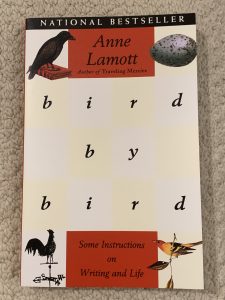
Anne Carson’s Bird by Bird, which houses the chapter, “Shitty First Drafts.”
The other day, part of my thesis was due. As the deadline loomed, I found myself unable to write more than half a page. I crafted opening line after opening line, but no matter how many times I stepped away from my writing to gain a new perspective, I couldn’t move beyond the first couple of paragraphs.
Since turning those pages in, I have come to realize that what prevented these starts from leading to anything more than frustration and abandonment was my own inability to let drafts be drafts. Each day, after struggling through a paragraph, I would look back at what I had left on the page and cringe in horror. Everything I had written sucked. It was absolutely terrible and completely unsalvageable, and the only option left was to begin again. I cannot go on writing like this, I would think to myself.
I could not, in the words of Anne Lamott, whose highly relatable essay continues to haunt me from my time in UWriting, simply allow myself to write a “shitty first draft.” This is not to say that the draft I wrangled out in the end was any good. Certainly not. However, what my draft did have that shitty first drafts don’t require is some arbitrary feeling of rightness that allowed me to say, okay, this is not the worst thing I have ever written in my life. This is not an abomination to the written word. I can keep going.
Unfortunately, I am unable to produce this arbitrary feeling of rightness at will. It comes and goes seemingly of its own accord, a very unreliable and stressful writing partner. As I wrote, I kept searching for the right sentences, phrases, words, even, that would coax this feeling out of hiding. Rather than letting pale descriptions lie limp, sentences run on and on, robotic, stiff-kneed tone rust, I was, as my senior seminar advisor pointed out, constantly filtering and editing everything in my head before allowing it access to the page. The result was that if I was unable to edit something to a satisfactory degree in my head, then it wouldn’t make it on the page. Under strict lockdown, only those sentences authorized to leave were allowed to do so.
Self-editing is antithetical to shitty first drafts. First drafts are there to be vomity, all the blah blah gross parts of your unconscious spewed across the page. They don’t need to have an argument, way in or out or unifying structure. They’re not meant to have gatekeepers dictating what is allowed in or how such content should be dressed. There is no “right” to be felt, only raw, uncut feeling.
Since submitting the pages the other day, I have begun to wonder whether my difficulty writing a first draft lies in the types of drafts I associate with the word “draft.” In the past, I’ve had professors invite students to submit drafts for them to review before the final deadline. The presumption is, though, that the draft you send to a professor isn’t a shitty first draft but a coherent second draft or a revised third. As a consequence of having to submit such edited drafts to professors, perhaps drafts have come to represent too polished of a specimen in my mind. Perhaps even Lamott’s invitation to be shitty feels too shiny.
As I continue adding to my thesis, I wonder what I can do to decrease my tendency to self-edit. My current idea relies on freewriting. Freewriting, in my mind, is like falling, like rushing unencumbered. Perhaps there are ways to fall gracefully, but if so, they are unknown to me. To write like one is falling is to truly accept there is no going back. Gravity stops for no one. You keep falling down. There is no time to review, to glance back over your shoulder and consider the quickly diminishing view. To freewrite is to accept that the words are out of your hands, already behind you the moment they appear.
Some people use freewriting as a form of pre-drafting, as a way to generate ideas rather than generate a body of words to manipulate for further use. For me, I am wondering whether approaching freewriting not simply as a pre-drafting exercise but as a drafting tool, will allow me to fall into a shitty first draft. Perhaps telling myself I am freewriting, not drafting, will distance myself from any notion of editing, will allow me to write free of filters.
